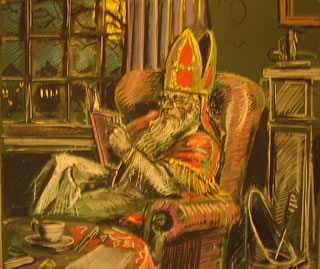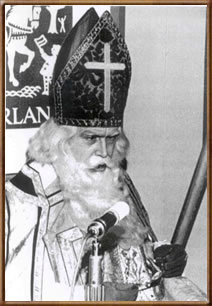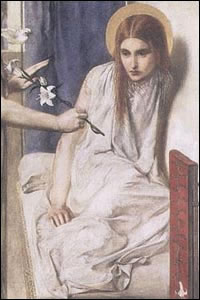Uit: De Kleine Catechismus van St. Nicolaas
Vraag: bestaan er meerdere Sinterklazen?
Antwoord: Er bestaat slechts één Sinterklaas, doch in meerdere personen.
Vraag: Wat moeten wij denken van de meening dat er geen Sinterklaas zou bestaan?
Antwoord: De meening dat er geen Sinterklaas zou bestaan, is een afschuwelijke ketterij, die wij met kracht moeten bestrijden.
Vraag: Hoe is het mogelijk dat Sinterklaas met paard en al door den schoorsteen komt?
Antwoord: Dat Sinterklaas met paard en al door den schoorsteen komt, is een mysterie, dat wij kinderlijk moeten aanvaarden.
Vraag: Zal ons dit mysterie ooit worden uitgelegd?
Antwoord: Dit mysterie zal ons in het hiernamaals door Sinterklaas zelf worden uitgelegd.
Vraag: Waarom rijdt Sinterklaas over de daken?Antwoord: Sinterklaas rijdt over de daken om vijf redenen:
1e omdat het een wonder is;
2e omdat daar het minste kwaad gebeurt;
3e omdat daar de meeste schoorstenen staan;
4e uit de macht der gewoonte;
5e omdat Hij boven hoogtevrees staat.

Vraag: Hoe is het te verklaren dat Sinterklaas meer aan rijke dan aan arme kindertjes geeft?
Antwoord: Dat Sinterklaas meer aan rijke dan aan arme kinderen geeft, is wederom een mysterie.
Vraag: Zal ook dit mysterie ons in het hiernamaals verklaard worden?
Antwoord: Neen. Dit mysterie zal ons, naarmate wij ouder worden, reeds op aarde duidelijk worden.
Vraag: Heeft Sinterklaas ook vijanden?
Antwoord: Sinterklaas heeft drie vijanden, te weten: de Paaschhaas, het Kerstmannetje en zij, die weigeren Hem als ernst te beschouwen. Van de eerste twee zegt Hij dat Hij niet gelooft dat ze bestaan, en van de derde dat het niet bestaat dat ze niet gelooven.

Godfried Bomans (2 maart 1913 – 22 december 1971)
De Engelse dichteres en schrijfster Christina Georgina Rossetti werd geboren in Londen op 5 december 1830. Zie ook alle tags voor Christina Rossetti op dit blog.
A Birthday
My heart is like a singing bird
Whose nest is in a water’d shoot;
My heart is like an apple-tree
Whose boughs are bent with thick-set fruit;
My heart is like a rainbow shell
That paddles in a halcyon sea;
My heart is gladder than all these,
Because my love is come to me.
Raise me a daïs of silk and down;
Hang it with vair and purple dyes;
Carve it in doves and pomegranates,
And peacocks with a hundred eyes;
Work it in gold and silver grapes,
In leaves and silver fleurs-de-lys;
Because the birthday of my life
Is come, my love is come to me.
At Home
When I was dead, my spirit turned
To seek the much-frequented house:
I passed the door, and saw my friends
Feasting beneath green orange boughs;
From hand to hand they pushed the wine,
They sucked the pulp of plum and peach;
They sang, they jested, and they laughed,
For each was loved of each.
I listened to their honest chat:
Said one: ‘To-morrow we shall be
Plod plod along the featureless sands
And coasting miles and miles of sea.’
Said one: ‘Before the turn of tide
We will achieve the eyrie-seat.’
Said one: ‘To-morrow shall be like
To-day, but much more sweet.’
‘To-morrow,’ said they, strong with hope,
And dwelt upon the pleasant way:
‘To-morrow,’ cried they one and all,
While no one spoke of yesterday.
Their life stood full at blessed noon;
I, only I, had passed away:
‘To-morrow and to-day,’ they cried;
I was of yesterday.
I shivered comfortless, but cast
No chill across the tablecloth;
I all-forgotten shivered, sad
To stay and yet to part how loth:
I passed from the familiar room,
I who from love had passed away,
Like the remembrance of a guest
That tarrieth but a day.

Christina Rossetti (5 december 1830 – 27 december 1894)
Geschilderd door haar broer Dante Gabriel Rossetti
De Russische dichter Fjodor Tjoettsjev werd geboren op 5 december 1803 in Ovstug in het gouvernement Orjol. Zie ook alle tags voor Fjodor Tjoettsjev op dit blog.
Say Not He Loves Me
Say not he loves me as before, as truly, dearly
As once he did… Oh no! My life
He would destroy, he does destroy – though see I clearly
The trembling of the hand that holds the knife.
Resentment, anger, tears, a pain now fierce, now muffled –
I’m wounded, stung, and yet I love… He is
All of my life, but I… I do not live – I suffer…
How bitter is existence such as this!
As to a mortal foe, in dozes scant and meagre
The air I breathe he measures out.. Each breath
I take is painful, yet… I breathe, for fresh air eager…
But life … life slowly ebbs… I cannot ward off death.

Fjodor Tjoettsjev (5 december 1803 – 27 juli 1873)
Portret door Andrej Alexandrovsky
De Russische dichter Afanasy Afanasievich Fet werd geboren op 5 december 1820 nabij Mzensk. Zie ook alle tags voor Afanasy Fet op dit blog.
When you were reading those tormented lines
When you were reading those tormented lines
In which the heart’s resonant flame sends out glowing streams
And passion’s fatal torrents rear up,-
Didn’t you recall a single thing?
I can’t believe it! That night on the steppe
When, in the midnight mist a premature dawn,
Transparent, lovely as a miracle,
Broke in the distance before you
And your unwilling eye was to this beauty drawn
To that majestic glow beyond the realm of darkness,-
How could it be that nothing whispered to you then:
A man has perished in that fire!

Afanasy Fet (5 december 1820 – 3 december 1892)
Portret door Ilya Repin
De Oostenrijkse schrijver en taalkundige Alois Brandstetter werd op 5 december 1938 in Aichmühl bei Pichl, Oberösterreich geboren. Zie ook alle tags voor Alois Brandstetter op dit blog.
Uit: Hier kocht der Wirt
»Wegen einem hängt der Wirt den Reif nicht auf. «
Das ist ein altes Sprichwort, das ich gern benutze. Es stammt aus dem Altertum, als es noch keine festen Öffnungszeiten gegeben hat. Damals hat sich ein Wirt also wirklich nach der Nachfrage gerichtet, und das Geschäft ist frei vor sich gegangen. Heute muß jeder Wirt und jeder Geschäftsmann sein Angebot nach der Nachfrage der Behörde ausrichten, der Wirt und die Gäste können dann zusammenkommen, wenn es der Politik paßt und wenn der Wirtschaftsminister den Reif aufhängt. Jetzt kann’s sein, daß der Wirt den Reif wegen einem aufhängen muß und wegen oder trotz zwanzig den Reif nicht aufhängen darf!
Bei mir in Gerlamoos in Oberkärnten schaut die Geschichte natürlich ein bisserl anders aus. Wo kein Kläger ist, da ist kein Richter, heißt ein anderes altes Sprichwort, und Wien ist weit! Was also mich, Peter Glantschnig, Wirt zu Gerlamoos, betrifft, so halte ich mich im eigenen Interesse an die Sperrstunde. Von einer Vorschrift, den ganzen Tag und die halbe Nacht offenhalten zu müssen, weiß ich aber nichts. Und wenn eine Reisegruppe ankommt und die Georgskirche besichtigen will und eine Führung braucht, dann mache ich mein Wirtshaus dicht und hänge dieses Schild da, mit der Aufschrift BIN IN DER KIRCHE, an die Wirtshaustür.
Es wird deswegen schon nicht gleich einer verdursten oder verhungern. Und die paar Gäste, die ich heute noch habe, kennen meinen Hausbrauch auch schon, die setzen sich geduldig auf eine Bank im Gastgarten und warten halt ein bisserl, wenn ich nicht grad eine Aushilf hab.
Am Anfang, wie ich den Schlüssel zur Georgskirche mit den Fresken des Thomas von Villach, den ich aber meistens Thomas oder Meister von Gerlamoos nenne, wie es auch in den älteren Büchern steht, übernommen hab, damals vor ungefähr zwanzig Jahren, da hab ich alles ehrenamtlich gemacht. Ich verlange natürlich auch heute für den Schlüssel nichts, aber nachdem ich auch Erklärungen und Führungen anbiete, wehre ich mich jetzt gegen freiwillige Spenden und kleinere Zuwendungen, die man mir in die Tasche steckt oder in die Hand gibt, keineswegs. Einen Hut habe ich keinen.
Schließlich entstehen mir durch den »Kirchendienst« im Wirtshaus Ausfälle und Unkosten. Heute verdiene ich freilich am Thomas von Villach oft schon mehr als mit dem Villacher Bier. Einmal hat ein Gast aus dem Ort ein bisserl letzmäulig gemeint, ich betreib inzwischen zwei Geschäfte, die Georgskirche und das Wirtshaus, und zwar in dieser Reihenfolge.“

Alois Brandstetter (Aichmühl , 5 december 1938)
De Amerikaanse schrijfster Joan Didion werd geboren in Sacramento Valley op 5 december 1934. Zie ook alle tags voor Joan Didion op dit blog.
Uit: The Year of Magical Thinking
“Life changes fast.
Life changes in the instant.
You sit down to dinner and life as you know it ends.
The question of self-pity.
Those were the first words I wrote after it happened. The computer dating on the Microsoft Word file (“Notes on change.doc”) reads “May 20, 2004, 11:11 p.m.,” but that would have been a case of my opening the file and reflexively pressing save when I closed it. I had made no changes to that file in May. I had made no changes to that file since I wrote the words, in January 2004, a day or two or three after the fact.
For a long time I wrote nothing else.
Life changes in the instant.
The ordinary instant.
At some point, in the interest of remembering what seemed most striking about what had happened, I considered adding those words, “the ordinary instant.” I saw immediately that there would be no need to add the word “ordinary,” because there would be no forgetting it: the word never left my mind. It was in fact the ordinary nature of everything preceding the event that prevented me from truly believing it had happened, absorbing it, incorporating it, getting past it. I recognize now that there was nothing unusual in this: confronted with sudden disaster we all focus on how unremarkable the circumstances were in which the unthinkable occurred, the clear blue sky from which the plane fell, the routine errand that ended on the shoulder with the car in flames, the swings where the children were playing as usual when the rattlesnake struck from the ivy. “He was on his way home from work—happy, successful, healthy—and then, gone,” I read in the account of a psychiatric nurse whose husband was killed in a highway accident. In 1966 I happened to interview many people who had been living in Honolulu on the morning of December 7, 1941; without exception, these people began their accounts of Pearl Harbor by telling me what an “ordinary Sunday morning” it had been. “It was just an ordinary beautiful September day,” people still say when asked to describe the morning in New York when American Airlines 11 and United Airlines 175 got flown into the World Trade towers. Even the report of the 9/11 Commission opened on this insistently premonitory and yet still dumbstruck narrative note: “Tuesday, September 11, 2001, dawned temperate and nearly cloudless in the eastern United States.”

Joan Didion (Sacramento Valley, 5 december 1934)
De Britse schrijver en regisseur Hanif Kureishi werd geboren op 5 december 1954 in Bromley, Kent. Zie ook alle tags voor Hanif Kureishi op dit blog.
Uit: Gabriel’s Gift
““School — how was, today?”
“Learning makes me feel ignorant,” said Gabriel. “Has Dad rung?”
As well as the fact he didn’t know where his father was, something strange was happening to the weather in Gabriel’s neighborhood. That morning, when he left for school with Hannah, there was a light spring shower, and it was autumn.
By the time they had reached the school gates, a layer of snow sat on their hats. At lunchtime in the playground, the hot floodlight of the sun — suddenly illuminated like a lamp — had been so bright the kids played in shirtsleeves.
In the late afternoon, when he and Hannah were hurrying home along the edge of the park, Gabriel became certain that the leaves in the park were being plucked from the ground and fluttered back to the trees from which they had fallen, before turning green again.
From the corner of his eye, Gabriel noticed something even odder.
A row of daffodils were lifting their heads and dropping them like bowing ballerinas at the end of a performance. When one of them winked, Gabriel looked around before gripping Hannah’s hairy hand, something he had always been reluctant to do, particularly if a friend might see him. But today was different: the world was losing its mind.
“Has he been in touch?” Gabriel asked.
Hannah was the foreign au pair.
“Who?” she said.
“My father.”
“Certainly no. Gone away! Gone!”
Gabriel’s father had left home, at Mum’s instigation, three months ago. Unusually, it had been several days since he had phoned, and at least two weeks since Gabriel had seen him.
Gabriel determined that as soon as they got back he would make a drawing of thewinking daffodil, to remind him to tell his father about it. Dad loved to sing, or recite poetry. “Fair daffodils, we weep to see / You haste away so soon…” he would chant as they walked.
For Dad the shops, pavements and people were alive like nature, though with more human interest, and as ever-changing as trees, water or the sky.
In contrast, Hannah looked straight ahead, as if she were walking in a cupboard. She understood little English and when Gabriel spoke to her she grimaced and frowned like someone trying to swallow an ashtray. Perhaps they were both amazed that a kid spoke better English than she did.”

Hanif Kureishi (Bromley, 5 december 1954)
De Amerikaanse schrijver, journalist en columnist Calvin (Bud) Marshall Trillin werd geboren op 5 december 1935 in Kansas City, Missouri. Zie ook alle tags voor Calvin Trillin op dit blog.
Uit: Feeding a Yen
“Not long after the turn of the millennium, I had an extended father-daughter conversation with my older daughter, Abigail, on the way back from a dim sum lunch in Chinatown. Abigail, who was living in San Francisco, had come to New York to present a paper at a conference. As a group of us trooped back toward our house in Greenwich Village, where she’d grown up, Abigail and I happened to be walking together. “Let’s get this straight, Abigail,” I said, after we’d finished off some topic and had gone along in silence for a few yards. “If I can find those gnarly little dark pumpernickel bagels that we used to get at Tanenbaum’s, you’ll move back to New York. Right?”
“Absolutely,” Abigail said.
There’s a great comfort in realizing that a child you’ve helped rear has grown up with her priorities straight. When I phoned Abigail from the Oakland airport once to ask if she knew of an alternative route to her house in San Francisco–I’d learned of a huge traffic jam on the normal route, toward the Bay Bridge–she said, “Sure. Go south on 880, take 92 west across the bridge to 101, and we’ll meet you at Fook Yuen for lunch.” Fook Yuen is a dim sum restaurant in Millbrae, about five minutes from the San Francisco airport, and its way with a dumpling has persuaded us that flights in and out of San Francisco are best scheduled in the middle of the day. I report this response to a traffic jam as a way of demonstrating not simply that Abigail always has a fallback career as a taxi dispatcher awaiting her but also that she has the sort of culinary standards that could induce her to switch coasts if the right bagel came along.“

Calvin Trillin (Kansas City, 5 december 1935)
De Duitse dichteres en schrijfster Eugenie Marlitt werd geboren op 5 december 1825 in Arnstadt. Zie ook alle tags voor Eugenie Marlitt op dit blog.
Uit: Reichsgräfin Gisela
“Seit dem Tode des Hüttenmeisters waren elf Jahre verflossen… Wäre – wie ein frommer Wahn annimmt – der abgeschiedene, unsterbliche Menschengeist wirklich verurteilt, in ewig beschaulicher Untätigkeit auf die alte irdische Heimat herabzusehen, dann hätte der Verstorbene, dessen Herz so warm und so treu für seine bedürftigen Landsleute geschlagen hatte, die tiefste Genugtuung empfinden müssen beim Anblick des Neuenfelder Tales.
Das weiße Schloß freilich lag noch so unberührt von Zeit und Wetter auf dem grünen Talgrunde, als sei es während der langen elf Jahre von einer konservierenden Glasglocke überwölbt gewesen… Da sprangen die Fontänen unveränderlich bis zu dem wie in den Lüften festgezauberten Gipfelpunkt, und ihr niederfallender Sprühregen ließ die Lichter des Himmels als Gold- und Silberfunken auf der beweglichen Wasserfläche des Bassins noch immer unermüdlich tanzen. Die Boskette, die Lindenalleen, das grüne Gefieder der Rasenplätze verharrte pflichtschuldigst in den Linien, die ihnen die künstlerische Hand des Gärtners vorgeschrieben. Auf den Balkonen leuchtete das unverblichene Federkleid der Papageien – sie schrien und plapperten die alten eingelernten Phrasen –, und im Schlosse flüsterten und huschten die Menschengestalten mit gebogenem Rücken und scheu devotem Fußtritt genau wie vor elf Jahren. Und sie waren wie hineingegossen in ihre Kniehosen und Strümpfe, und auf den blankgeputzten Rockknöpfen prangte das adlige Wappen, das den freigeborenen Menschen zum »Gut« stempelte.
Um alle diese wohlkonservierten Herrlichkeiten aber legte sich das ungeheure Viereck der Schloßgartenmauer, leuchtend weiß, sonder Tadel – es war ein streng behütetes Fleckchen Erde, konservativ, unverrückbar stillstehend in den einmal gegebenen Formen, wie die Adelsprinzipien selbst.“

Eugenie Marlitt (5 december 1825 – 22 juni 1887)
Zie voor onderstaande schrijvers ook mijn blog van 5 december 2008.
De Duitse schrijver Hans Hellmut Kirst werd geboren op 5 december 1914 te Osterode (voorm. Ost Preussen, nu Polen).
De Indische dichter Josh Malihabadi werd geboren in Malihabad in Brits India op 5 december 1898.
